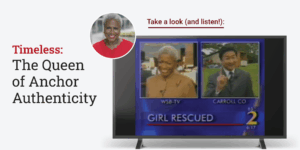In a 2011 New York Times column, David Brooks described seventy-something Phillip Leakey as gripped by the sort of “compulsive curiosity” that causes a baby to take something that doesn’t make sense and “become instantly absorbed; using all her abilities — taste, smell, force — to figure out how it fits in with the world.”
I wish we could describe more anchors that way. We know talent who are as experienced and polished as any professional on earth. They know how to dress and they know how to move. Their voices are perfectly modulated. They are warm and witty in the cross-talk. They are, in fact, everything you could possibly want on-the-air — except curious. And I just don’t mean politely curious, which is the kind of curiosity showcased in the sanitized, premeditated anchor/reporter exchanges that pepper many newscasts. I mean I-really-need-to-know-and-I-won’t-stop-until-I-get-an-answer curious. I mean getting-to-the-truth-of-this-is-more-important-than-making-sure-everyone-looks-good curious. I mean a need-to-know that’s forceful enough to trump almost every other imperative we assign to the production of newscasts.
So how does this happen? Why have so many of our anchors — and the newscasts they serve — lost their get-to-the-bottom-of-things mojo? Systematically, it is an unintended consequence of a marriage between our mastery of technology and our fear of failure. Driven to manage unpredictability and minimize mistakes, we have mastered the art of preproducing and premeditating almost everything, including the questions we ask.
Having done all of their thinking for them before the newscast, we make it possible for anchors to do their job without much thinking during the newscast. In fact, we often discourage it, because we don’t want their real attention — and the spontaneity that could ensue — to jeopardize story count. Or we don’t want to risk someone asking a question we can’t guarantee a reporter knows how to answer. Or we don’t trust the anchor’s ability to think and respond appropriately. Or the robotics — and the people that run them — just can’t handle anything that’s not already programmed into the system. Or — and this is true more often than we may like to admit — we’ve promoted people into the job who just aren’t capable of it.
Whatever the reason, when delivery is not driven by curiosity and the real questions it inspires — by the need to know more and to understand better — it becomes an exercise in style instead of substance. It has no soul. And a newscast without soul is easy to ignore, no matter how good the anchors might look and how perfect they might sound. They begin to look and sound just like all the other beautiful people with all the other beautiful voices — the ones doing all those other newscasts that look and sound like yours. It’s all pleasant enough to watch when I have the time, but I do not feel compelled to watch. It simply lacks the force and the life that animates people when they are driven to know and to understand. And will not be denied until they do.
Just like that baby.


